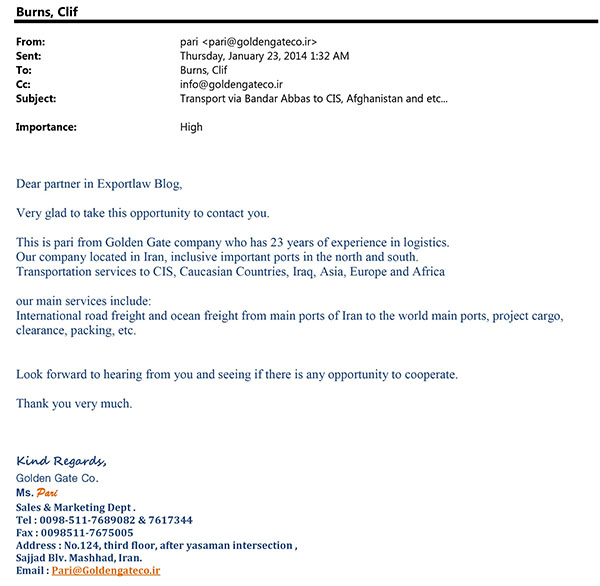![By Sgt. Scott M. Biscuiti [Public domain], via Wikimedia Commons http://commons.wikimedia.org/wiki/File%3ADefense.gov_photo_essay_090329-M-7747B-015.jpg By Sgt. Scott M. Biscuiti [Public domain], via Wikimedia Commons http://commons.wikimedia.org/wiki/File%3ADefense.gov_photo_essay_090329-M-7747B-015.jpg](https://www.exportlawblog.com/images/thermal_sight.jpg) Back in November, this blog reported on the indictment of a Russian citizen, Roman Kvinikadze, on charges that he attempted to export military thermal imaging sights without the required State Department license. As we noted then, the indictment created a bit of a diplomatic row between the United States and Russia, with Russia claiming that federal agents knowingly provoked Kvinikadze to violate the law and then lured him into the United States to arrest him. The Russian pique was directed at statements by the undercover U.S. agent to Kvinikadze that the sights required an export license but that if the license was unavailable there were other ways he could ship the sights to Kvinikadze. Although these facts might not support the narrowly construed entrapment defense, they can easily been seen as grounds for a diplomatic contretemps.
Back in November, this blog reported on the indictment of a Russian citizen, Roman Kvinikadze, on charges that he attempted to export military thermal imaging sights without the required State Department license. As we noted then, the indictment created a bit of a diplomatic row between the United States and Russia, with Russia claiming that federal agents knowingly provoked Kvinikadze to violate the law and then lured him into the United States to arrest him. The Russian pique was directed at statements by the undercover U.S. agent to Kvinikadze that the sights required an export license but that if the license was unavailable there were other ways he could ship the sights to Kvinikadze. Although these facts might not support the narrowly construed entrapment defense, they can easily been seen as grounds for a diplomatic contretemps.
Well, the Russian irritation seems to have been heard loud and clear in Washington. Last week, a federal judge sentenced Kvinikadze, who had entered a guilty plea, to time served and a $7500 fine. He also ordered Kvinikadze to leave the United States, something that Kvinikadze was no doubt happy to do with or without a judicial order requiring him to do so. Kvinikadze had been in custody for 147 days so time served was significantly less than would have been required under federal sentencing guidelines which would have specified a minimum sentence of 33 to 41 months. News reports stated that the prosecutor requested the reduced sentence, and the judge justified it by stating that “Kvinikadze may not have fully appreciated the potential damage to relations between the U.S. and Russia if the sights had fallen into wrong hands.”
When I reviewed the docket to see if I could find anything else to justify this lenient sentence, I discovered that the Presentence Report, the Presentence Report Recommendation and an Addendum to the Presentence Report were all sealed and unavailable for review. Although there are a number of reasons that this could be the case, including the possibility of the discussion of some extremely private matters involving Kvinikadze, my money is that these were sealed because they have a discussion of the diplomatic ramifications of the sentence, something that prosecutors and courts are loathe to reveal. So when Kvinikadze is safely back in Russia, I’m going to bet he sends an effusive thank you note to his BFF Vladimir Putin.

 Posted by
Posted by  Category:
Category: 

![By Jean-Pierre Bazard Jpbazard (Own work) [GFDL (http://www.gnu.org/copyleft/fdl.html) or CC-BY-SA-3.0-2.5-2.0-1.0 (http://creativecommons.org/licenses/by-sa/3.0)], via Wikimedia Commons http://commons.wikimedia.org/wiki/File%3ALe_navire_cargo_%E2%80%98%E2%80%99Iran_Sadr%E2%80%98%E2%80%99_(6).jpg By Jean-Pierre Bazard Jpbazard (Own work) [GFDL (http://www.gnu.org/copyleft/fdl.html) or CC-BY-SA-3.0-2.5-2.0-1.0 (http://creativecommons.org/licenses/by-sa/3.0)], via Wikimedia Commons http://commons.wikimedia.org/wiki/File%3ALe_navire_cargo_%E2%80%98%E2%80%99Iran_Sadr%E2%80%98%E2%80%99_(6).jpg](https://www.exportlawblog.com/images/iran boat.jpg)
![Amplifier Research HQ Street View from Google http://www.google.com/permissions/geoguidelines/attr-guide.html [By Permission] Amplifier Research HQ Street View from Google http://www.google.com/permissions/geoguidelines/attr-guide.html [By Permission]](https://www.exportlawblog.com/images/AR_HQ.jpg)
![Chinese Army training with computers [Fair Use] Chinese Army training with computers [Fair Use]](https://www.exportlawblog.com/images/Chinese Hackers.jpg) Back in December, IBM issued a
Back in December, IBM issued a 


